

Predicting The Future. Volkswagen's $600 car gets 258 mpg - National Trendy Living. El Coche de Aire Comprimido. The Super Supercapacitor. Justin Hall-Tipping: Freeing energy from the grid. Donald Sadoway: The missing link to renewable energy. YouTube. Steven Cowley: Fusion is energy's future. Dennis Hong: My seven species of robot. Vijay Kumar: Robots that fly ... and cooperate.
Moore's law. Moore's law is the observation that, over the history of computing hardware, the number of transistors on integrated circuits doubles approximately every two years.
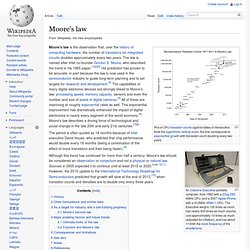
The law is named after Intel co-founder Gordon E. Moore, who described the trend in his 1965 paper.[1][2][3] His prediction has proven to be accurate, in part because the law is now used in the semiconductor industry to guide long-term planning and to set targets for research and development.[4] The capabilities of many digital electronic devices are strongly linked to Moore's law: processing speed, memory capacity, sensors and even the number and size of pixels in digital cameras.[5] All of these are improving at roughly exponential rates as well. This exponential improvement has dramatically enhanced the impact of digital electronics in nearly every segment of the world economy.[6] Moore's law describes a driving force of technological and social change in the late 20th and early 21st centuries.[7][8] History[edit]
Predictions made by Ray Kurzweil. American author, inventor and futurist Raymond Kurzweil has become well known for predicting the future of artificial intelligence and the human race.
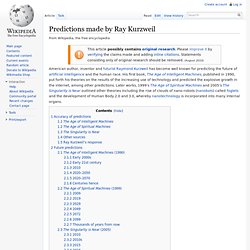
His first book, The Age of Intelligent Machines, published in 1990, put forth his theories on the results of the increasing use of technology and predicted the explosive growth in the internet, among other predictions. Later works, 1999's The Age of Spiritual Machines and 2005's The Singularity is Near outlined other theories including the rise of clouds of nano-robots (nanobots) called foglets and the development of Human Body 2.0 and 3.0, whereby nanotechnology is incorporated into many internal organs.
Accuracy of predictions[edit] The Age of Intelligent Machines[edit] Perhaps most significantly, Kurzweil foresaw the explosive growth in worldwide Internet use that began in the 1990s. Siri Creator Working On Sci-Fi Interface That Predicts Your Thoughts. When Siri was first released, it was received with a bit of skepticism.
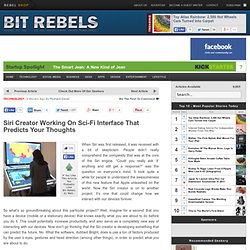
People didn’t really comprehend the complexity that was at the core of the Siri engine. “Could you really ask ‘it’ anything and still get a response?” Was the question on everyone’s mind. It took quite a while for people to understand the awesomeness of this new feature that Apple unleashed on the world. Top 10 New Future Jobs. Ray Kurzweil, Featured Speaker. Technological singularity. The technological singularity is the hypothesis that accelerating progress in technologies will cause a runaway effect wherein artificial intelligence will exceed human intellectual capacity and control, thus radically changing civilization in an event called the singularity.[1] Because the capabilities of such an intelligence may be impossible for a human to comprehend, the technological singularity is an occurrence beyond which events may become unpredictable, unfavorable, or even unfathomable.[2] The first use of the term "singularity" in this context was by mathematician John von Neumann.
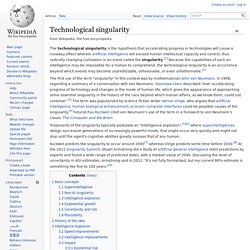
Proponents of the singularity typically postulate an "intelligence explosion",[5][6] where superintelligences design successive generations of increasingly powerful minds, that might occur very quickly and might not stop until the agent's cognitive abilities greatly surpass that of any human. Basic concepts. SUPER PODERES / El perfeccionamiento humano / Documental. Geneticists Discover a Way to Extend Lifespans to 800 Years. How Will Humans Respond to Immortality?
Thanks for the responses!
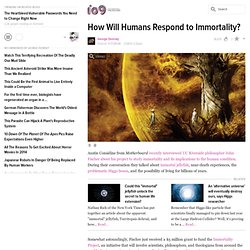
What really drives resource consumption instead is rising standards of living. But rising everyone standards of living is good because it is very strongly correlated with increases in women's social, economic and political rights, improvements in people's eductation, a vast reduction in infant mortality and huge reduction in birth rates. I agree! The Age of Spiritual Machines. The Age of Spiritual Machines is a non-fiction book by inventor and futurist Ray Kurzweil about artificial intelligence and the future course of humanity.
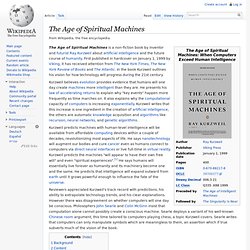
First published in hardcover on January 1, 1999 by Viking, it has received attention from The New York Times, The New York Review of Books and The Atlantic. In the book Kurzweil outlines his vision for how technology will progress during the 21st century. Kurzweil predicts machines with human-level intelligence will be available from affordable computing devices within a couple of decades, revolutionizing most aspects of life. He says nanotechnology will augment our bodies and cure cancer even as humans connect to computers via direct neural interfaces or live full-time in virtual reality.
Kurzweil predicts the machines "will appear to have their own free will" and even "spiritual experiences". Reviewers appreciated Kurzweil's track record with predictions, his ability to extrapolate technology trends, and his clear explanations. Un magnate ruso invita a la ONU a crear una 'neohumanidad' de cíborgs inmortales. Kara de Quantic Dream (subtitulado) Will Robots Ever Develop Feelings? - James May's Q&A (Ep 23) - Head Squeeze & Alltime10s. 2045: Una nueva era para la humanidad (2045: A New Era for Humanity) Transhumanismo VS Integridad Humana. No es por ser cansino con el transhumanismo pero es uno de los temas que más tiempo dedico y llaman mi atención.

Entre el transhumanismo y la inmortalidad, ¿hay espacio para la integridad humana? El concepto de “lo humano” tal y como lo entendemos actualmente, ¿desaparecerá en un futuro próximo cuando por medios técnicos y avatares robotizados se alcance la inmortalidad? Transhumanism. Transhumanism (abbreviated as H+ or h+) is an international cultural and intellectual movement with an eventual goal of fundamentally transforming the human condition by developing and making widely available technologies to greatly enhance human intellectual, physical, and psychological capacities.[1] Transhumanist thinkers study the potential benefits and dangers of emerging technologies that could overcome fundamental human limitations, as well as the ethics of developing and using such technologies.
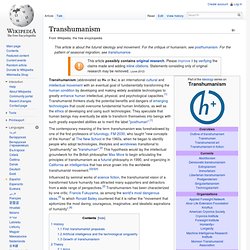
They speculate that human beings may eventually be able to transform themselves into beings with such greatly expanded abilities as to merit the label "posthuman".[1] History[edit] A Transhumanism of Ethics. Posted: Wed, January 02, 2013 | By: Special Guest by Enrique Lescure While still a pretty unknown tendency in Sweden and the other Scandinavian countries (where atheist humanism just recently has started to troll the consensus culture), transhumanism is a growing current in the Anglo-Saxon world.
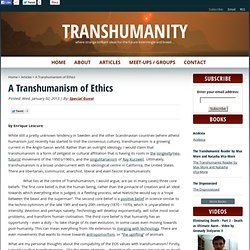
Rather than an outright ideology, I would claim that transhumanism is a form of zeitgeist or cultural affiliation that is having its roots in the longevity/neo-futurist movement of the 1950′s/1960′s, and the singulitarianism of Ray Kurzweil. Ultimately, transhumanism is a broad undercurrent with its ideological centre in California, the United States. There are libertarian, communist, anarchist, liberal and even fascist transhumanists. Hibridar humanos y robots provocará una nueva brecha en la Humanidad. 2045: Man becomes machine. IBM Is Bringing Its Mega-Intelligence Watson to Your Smartphone. Siri is helpful when you want to schedule a reminder or look at the forecast, but wouldn't it be better to have a bona fide Jeopardy!

Champ in your pocket? IBM is trying to figure out how to bring the power of its superbrainy Watson to smartphones, helping people answer far more complex questions. Maybe a farmer would stand in his field and ask Watson where to plant his corn — the phone would chirp an instant reply based on Watson analysis of precipitation data, scientific studies and location trends, Bloomberg reports. Or maybe you can ask a couple questions and Watson can diagnose your illness, sending a a report to your doctor, offering advice on prescriptions and telling you where you can pick them up. John Hagel: Rethinking Race Against the Machines. Andrew McAfee: Race Against the Machine. Andrew McAfee: Are droids taking our jobs? Andrew McAfee: What will future jobs look like? The New Industrial Revolution - The Chronicle Review. By Jeffrey R. Young Chicago Illustration by Coneyl Fay, Science Source Baxter is a new type of worker, who is having no trouble getting a job these days, even in a tight economy.
IMPACT: Recession, tech kill middle-class jobs. NEW YORK (AP) — Five years after the start of the Great Recession, the toll is terrifyingly clear: Millions of middle-class jobs have been lost in developed countries the world over. And the situation is even worse than it appears. Most of the jobs will never return, and millions more are likely to vanish as well, say experts who study the labor market. What's more, these jobs aren't just being lost to China and other developing countries, and they aren't just factory work. Increasingly, jobs are disappearing in the service sector, home to two-thirds of all workers. The Robot Will See You Now - Jonathan Cohn. IBM's Watson—the same machine that beat Ken Jennings at Jeopardy—is now churning through case histories at Memorial Sloan-Kettering, learning to make diagnoses and treatment recommendations. This is one in a series of developments suggesting that technology may be about to disrupt health care in the same way it has disrupted so many other industries.
Are doctors necessary? Imagining a future when machines have all the jobs. WASHINGTON (AP) — Martin Ford saw it everywhere, even in his own business. Smarter machines and better software were helping companies do more work with fewer people. His Silicon Valley software firm used to put its programs on disks and ship them to customers. The disks were made, packaged and delivered by human beings. Now Ford's customers can just download the software to their computers — no disks, no packaging, no delivery workers.
"It is getting easier and easier to avoid hiring people by taking advantage of technology," Ford says. An ordinary entrepreneur might simply have welcomed the cost savings. Technological Unemployment. Automation will soon touch every job on the planet: prediction. First, the bad news: employment levels are lower than they were a decade ago, and those jobs aren't coming back. Blame automation for much of the lackluster job growth seen in the current economy. In fact, there soon will be few jobs that machines won't be able to do just as well as humans. That's the sobering prediction made by MIT professor Andrew McAfee, co-author of Rage Against the Machine, at his recent TED talk.
McAfee predicts that machines and software will be touching every job -- from knowledge workers to journalists to even truck drivers. At this point, he adds, we're only at the beginning stages of the digitization of jobs. Self-driving vehicles may put millions of truck drivers out of business. "Most knowledge workers are actually generalists," McAfee points out. Now, the good news: There are silver linings to this relentless growth in automation and smart systems, McAfee says. I LOST MY JOB. Rosie The Robot Won't Serve Your Food, But She'll Pick It : The Salt. BBC World Service - Global Business, Race Against the Machine. Welcome to Forbes. Marshall Brain - Automation & Unemployment. Will a Robot Take Your Job? Slowly, but surely, robots (and virtual ’bots that exist only as software) are taking over our jobs; according to one back-of-the-envelope projection, in ninety years “70 percent of today’s occupations will likewise be replaced by automation.”
Robot Revolution, will machines surpass humans (2013-05-04) Full HD 1080P. IBM Watson-Introduction and Future Applications. Jeremy Rifkin: A New Era of Capitalism. Green Home TV - Jeremy Rifkin - The Third Industrial Revolution. Will robots take all the jobs? Erik Brynjolfsson: The key to growth? Race with the machines. Shyam Sankar: The rise of human-computer cooperation. How Technology Is Destroying Jobs. Andrew McAfee: The Machines are Coming. Reworking the World of Work. Technology will replace 80% of what doctors do. Peter Diamandis - The best way to predict the future. Peter Diamandis: Abundance is our future. How to survive the future ? Drogas psicodélicas para prepararte para la singularidad tecnológica. On the exponential curve: inside Singularity University.
David Rowan Editor of Wired magazine. Quantum computing. Silicon electronics are a staple of the computing industry, but researchers are now exploring other techniques to deliver powerful computers. A quantum computer is a theoretical device that would make use of the properties of quantum mechanics, the realm of physics that deals with energy and matter at atomic scales. Google teams up with NASA on quantum computing lab. Quantum Machine Learning Singularity from Google, Kurzweil and Dwave ?
NASA and Google Team Up with Speedy D-Wave Quantum Computer : Tech. Google Buys a Quantum Computer. How Technology Is Destroying Jobs. Organizing the World's Scientific Knowledge to make it Universally Accessible and Powerful: Científicos logran implantar la primera memoria artificial en un cerebro vivo. To the space station and beyond with Linux. Ve la luz un nuevo catalizador de hidrógeno que se alimenta solo con energía solar. La lucha de los más duros: El carbino doblega al grafeno como el material más resistente.
Germans Developing Robot Ape. Investigación y Ciencia.